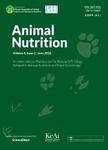Effects of biochanin A on lactational performance, nitrogen metabolism, and blood metabolites in dairy cows
作者机构:Chinese Acad Agr Sci Inst Anim Sci State Key Lab Anim Nutr Beijing 100193 Peoples R China
出 版 物:《ANIMAL NUTRITION》 (动物营养(英文版))
年 卷 期:2024年第18卷第3期
页 面:441-449页
核心收录:
学科分类:0905[农学-畜牧学] 0906[农学-兽医学] 09[农学]
基 金:National Key R&D Program of China [2022YFD130100 0] Agricultural Science and Technology Innovation Program [CAAS-ZDRW202308, ASTIP-IAS12] State Key Laboratory of Animal Nutrition and Feeding [2004DA125184G2108]
主 题:Biochanin A Lactational performance Nutritional metabolism Blood metabolite RED-CLOVER SILAGE FED DIETS ALFALFA SILAGE CRUDE PROTEIN EFFICIENCY RUMINANT GRASS RUMEN MATURITY SHEEP
摘 要:Optimizing nitrogen utilization efficiency and mitigating nitrogen losses in cows plays a pivotal role in fostering economic sustainability within contemporary agricultural systems. Biochanin A (BCA), a natural component in red clover, has the potential to improve nitrogen metabolism in dairy cows. The primary objective of this study was to probe the impact of biochanin A supplementation on lactational performance, nitrogen metabolism, and blood metabolites in dairy cows. A complete randomized block design experiment was conducted over 28 d, involving 36 multiparous Holstein cows (comparable milk yield = 37.1 +/- 2.90 kg, BW = 642 +/- 70.0 kg, days in milk = 92 +/- 8.0 d, and parity = 2.4 +/- 0.50), which were allocated to three treatment groups: the Control group (with 0 g/d BCA), the Low group (with 10 g/d per cow BCA), and the High group (with 40 g/d per cow BCA). Biochanin A supplementation improved the lactational performance of cows by increasing milk yield by 6.3% (P = 0.007) and feed efficiency by 12.7% (P = 0.009). Total intestinal apparent digestibility was unaffected by BCA supplementation (P 0.05), but microbial nitrogen was increased by 30.0% (P = 0.002) for promoting nitrogen utilization efficiency by 20.7% (P = 0.004). Milk competent yields (protein, lactose, and non-fat milk solid) were increased with increasing BCA supplementation (P 0.05). BCA did not affect body health of dairy cows. Additionally, none of the plasma endocrine hormones were affected (P 0.05). A total of 95 significantly different metabolites were screened from the plasma metabolites of cows in the BCA-added and non-added groups. After performing an enrichment analysis of the metabolic pathways associated with the different metabolites, six specific pathways were iden



